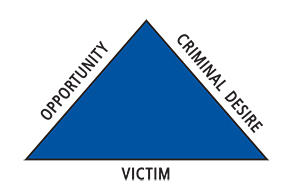CRIME PREVENTION BASICS
The majority of people practice basic crime prevention without giving it a lot of thought. We lock the doors when we leave our homes or take the keys when we park the car. Yet many of us fail to take what in many cases are obvious crime prevention measures because we routinely underestimate the risk of a common crime occurring.
Why Does This Happen?
The average person has difficulty thinking like a criminal. As a result they routinely fail to recognize the crime opportunities they create when they do such things as let their car warm up in the driveway or leave the screen door unlocked and the front door open while working in their backyards. Most opportunity crime is easy to avoid.
Avoiding Crime Opportunity
Before a crime can happen, three things must be present. There must be a victim. There must be criminal desire. And there must be crime opportunity. Crime opportunity is the pivotal factor because it acts like the trigger for a criminal event and ultimately brings the criminal together with the victim or their property. A simple graphic known as the crime triangle can help to illustrate this point.
 At any given time there are potential offenders and victims. Sometimes, the potential criminal and victim come in contact with each other, as represented by the point of the triangle, but a crime does not occur. This is most often due to lack of criminal opportunity and/or criminal desire and motivation. An example of this might be a car thief taking your neighbour’s car after walking past your house because your car is parked out of sight and locked in the garage.
At any given time there are potential offenders and victims. Sometimes, the potential criminal and victim come in contact with each other, as represented by the point of the triangle, but a crime does not occur. This is most often due to lack of criminal opportunity and/or criminal desire and motivation. An example of this might be a car thief taking your neighbour’s car after walking past your house because your car is parked out of sight and locked in the garage.
Other times a victim may not be so lucky because their actions provided a criminal with the type of opportunity they were looking for. In the case of our car thief example, your car may have been stolen had it been parked in the driveway where it is visible, vulnerable and accessible. By anticipating the potential for crime then taking some action to remove or reduce the threat, you have gone a long way to avoiding a crime.
Recognizing Crime Opportunity
Taking precautions doesn’t necessarily mean that you will never encounter a criminal. Occasionally you may observe or encounter someone in the process of actively checking out a crime opportunity or engaged in a criminal act. For your protection and the protection of others, it is vital that you learn to recognize a criminal encounter so that you can take some action to remove or reduce the threat. So many times we witness something that we think is strange, yet take no action because we invent or accept some explanation no matter how unlikely.
For instance, Police rarely receive suspicious activity calls if a resident answers their door only to find a teenager they have never seen before asking for someone who doesn’t live there. Yet a common tactic of residential burglars is to knock on a door prior to breaking-in to confirm their suspicions that no one is home. It is also just as unlikely that Police will receive a timely call if the criminal activity appears so blatant that an honest person discounts the possibility no matter what the circumstance.
For instance, people have been known not to call Police when they witness an unmarked moving van being used to clear property from a residence where they know the neighbour is not at home. The reason? It defies their belief that a criminal would never be so bold. It is important to always remember that the only way a criminal will identify himself is through their actions. If you see something that looks suspicious, you should always suspect criminal activity and never invent a legitimate reason for it. The proper course of action is to call your local Police and report your suspicions. Your actions may stop a criminal, prevent a crime and make your neighbourhood safer.
Preventing Crime Is Up To You
Crime prevention is the anticipation, recognition and appraisal of a crime risk and the initiation of some action to remove or reduce it. By knowing the basics of crime prevention, we can go a long way towards preventing crime. But no matter how good our knowledge, maximum benefits will only be achieved if we make crime prevention a habit.
Reprinted from Peel Police Fact Sheet







